- Home
- Jim Thompson
Heed the Thunder Page 7
Heed the Thunder Read online
Page 7
“Nothin’,” they said in unison.
“Uh-huh, I’ll bet, by God!”
“Honest, we wasn’t doing anything, Dad,” said Gus.
“Well,” said Sherman, “we’ll see.”
Robert looked into the kitchen, watching the two older girls redd up the dishes. They looked like boys with dresses on. Their hair was cut short—not bobbed—like their brothers’. It would be kept that way until they became young women and would have the leisure to look after it properly. There was no time for hairdressing at their age, and vermin were rife. Practically every farm girl, who was one of a large family, wore her hair short.
Tiny Ruthie awoke in her high chair, and came in and resumed her slumber on her father’s lap. The other girls disappeared into the milkshed, and presently the cream separator began its whining crescendo. It died down almost before it was well started, the nasal notes fading jerkily as the handle was left unturned.
“Mama!”
“What you want now?”
“Somethin’s funny, Mama. You come here.”
The floor creaked as Mrs. Fargo waddled into the milkshed.
“See, Mama. See that stuff.”
Mrs. Fargo said nothing. She even managed to get back into the kitchen almost noiselessly. Her one tactic was surprise, but she was a master of that.
She appeared in the door, suddenly, the spittle spraying furiously between her overhung teeth, her little eyes snapping venomously. She seemed to roll across the floor as if she were on coasters, and she cracked a long, leather blacksnake expertly.
“Yoooo h-whelps,” she wheezed. “You h-ornery devils! Yoooo—”
Gus and Ted sprang for the stair door, and she slashed the whip across their backs. They reached the door at the same time and jammed there, and their mother whined with glee as she lashed them. The whip sliced through the air, mercilessly, cracking against their shoulders with the sound of an exploding rifle.
“H-I’ll h-show you! H-I’ll peel you down to yooor d-dirty stinkin’ bones!…Funny, ain’t you? Awful dooorn funny! Why don’t you laugh, hey?”
The boys howled with pain and laughter. The two older girls looked on from the kitchen, their tanned faces frightened and amused. Sherman roared and snorted, and little Ruthie jiggled on his quaking belly. Robert giggled fearfully.
Gus and Ted squirmed through the door at last, and fled scrambling up the stairs. Panting, Mrs. Fargo turned to Robert and made an angry shooing motion. He darted past her, receiving a light tap from the blacksnake, and followed the boys.
“And don’t you raise no devilment up there!” she gasped. “You go to bed so’s you can start to school tomorrow.”
Robert said, “All right.” His cousins made subdued farting noises with their lips. They all went into the icy bedroom with its huge featherbed.
Gus and Ted slapped at each other, their close-set little eyes dancing. Gus rubbed his backside.
“You son-of-a-bitch, what’d you get in my way for?”
“You got in mine, you son-of-a-bitch.”
“Ask Bob, by God. He’ll tell the truth.”
“Bob don’t want to have nothing to do with a bastard like you.”
They guffawed aimlessly.
“Did you steal any of the old man’s tobacco?” Ted demanded.
“Why, hell yes,” said Gus. He dug into his pocket and pulled out a handful of rough-cut tobacco, somewhat adulterated with lint and cow manure.
“Well, let’s light up. Can’t you see Bob wants a smoke?”
Gus secured three corncob-and-grapevine pipes from the rear of the bottom bureau drawer, and packed them with tobacco. Ted passed matches. They sat down in a row at the head of the bed, their backs braced against the worn mahogany, their knees drawn up. Robert puffed his pipe with solemn expertness. The boys had introduced him to smoking at their first meeting, and he had practiced at each succeeding one.
“I thought you were—was building an airplane,” he said, bringing up a topic that was much on his mind. “You said you was going to build one and take me riding in it.”
Gus looked at him blankly. “Hell, Bob, didn’t we tell you about that?”
“Huh-uh,” said Robert; then, “Hell, no.”
“We already got ’er made,” Ted explained. “We got her hid in the hay up in the barn loft. She’s a humdinger, too, ain’t she, Gus?”
“A humdinger,” Gus nodded, billowing smoke from his nostrils. “We got her made out of two-by-fours, Bob—even the wings. That way it won’t break up so easy when it hits the ground.”
“What you got for wheels?”
“We got wheels,” said Ted proudly. “I took ’em off the mower.”
“Yes, you son-of-a-bitch, and the old man hided me for it.”
“Hidin’ will make your arse grow. You ain’t as broad across the arse now as a good man is between the eyes.”
“Yah. You ought to know.”
“Yah.”
They punched each other, careful not to strike Robert.
“Well, when we goin’ to go flyin’?” he inquired.…“Huh, Gus, huh, Ted? When you goin’ to take me for a ride?”
“We got to wait a while for that,” said Gus regretfully. “You see, we ain’t been able to steal no engine for it, so we’re going to have to fly her out of the barn loft, so she’ll sail, see?”
“Uh-huh. How you going to make it—her—go out, though?”
“Well, we figured you could steer her and me and Ted would give it a good push. Get it all the way back to the end of the loft so we could go out a-hellin’. Just before we get to the door, we’ll jump in with you.”
“Oh,” said Robert, pleased. “When we going to do it?”
“That’s what I was goin’ to tell you about. We got the wings too wide to go through the door, and we got to saw ’em off some. We’ll get around to it any day, now.”
Ted got up, pulled the pot from beneath the bed, and used it. He yawned and began unbuttoning his shirt. Gus, watching him, thoughtfully, suddenly gestured with the stem of his pipe.
“Say,” he frowned, “where do you go when you have to take a dump at night?”
“I go out to the privy, nat’cherly,” said Ted.
“I see you going out to the privy! Damned if I don’t. Come on, tell me.”
Ted demurred, and Gus persisted, cursing and wheedling him alternately.
“Hell,” said Ted, “you ought to be able to guess.”
“Is it in this room?”
“Yope. Right in this room.”
“The window?”
“Hell, no. In the room, you dummy.”
Gus allowed his eyes to wander around the room, scanning the walls and woodwork. They came to rest at last on the flue, the unused outlet of which was covered with a tin oval. They remained there for a long moment. He gestured again with the pipe stem.
“In there?”
Ted nodded modestly.
“Well, I’ll be goddamned. How you get your arse up that high?”
“I don’t. I tear me a piece of paper out of my tablet. Then I drop it in.” He grinned at his brother maliciously. “All these nights when you been holding in or tramping out to the privy, I’ve been using that.”
“Yah,” said Gus, scowling at him with ill-concealed admiration and envy. “I reckon you think you’re pretty smart.”
“I’m smarter’n you are. Yah!”
“Just wait till the old woman finds out. She’ll get a whiff of it one of these days.”
“Hell, she’d think she smelled her own cooking.”
He finished undressing and stood clad only in his long red flannel underwear. He stretched, lazily.
“Let’s go to bed, huh?”
“I ain’t sleepy,” said Gus, giving him a challenging look.
“Aw, come on, goddamit. Bob, you want to go to bed, don’t you?”
“Kind of. I want a drink of water first, though.”
“Gus, go get Bob a drink of water,” “Ted, go get Bob
a drink of water,” said Ted and Gus.
“You go, goddam you,” they said.
“But I got my clothes off,” said Ted. “It ain’t that I mind gettin’ you a drink, Bob,” he explained apologetically, “but it ain’t fair when he’s still dressed.”
Gus appeared to deliberate. “I’ll tell you what I’ll do with you,” he said in a man-to-man tone. “You go get the water, and then I’ll go to bed.”
“But you still got your clothes on!”
“Well, you don’t need to go downstairs. Reach out the window and get a handful of snow.”
“Why don’t you reach out?”
“Hell, what do you want for nothing? I ain’t going to do everything for you. You get the snow and I’ll get to bed.”
The argument sounded a trifle specious to Ted, but he was too weary for a prolonged discussion. He declared for perhaps the hundredth time that day that his brother was a son-of-a-bitch, stated that he was addicted to the eating of offal and the drinking of a liquid not popularly regarded as a beverage, and announced that he had been sexually intimate with skunks, all of whom had afterward died of shame. Having relieved himself of these facetiæ, he opened the window.
He cursed as an icy blast swept through the room, but he gamely unlatched the screen and reached out upon the porch roof.
On the bed, Gus winked at Bob and gathered his feet beneath him. “Lean farther out,” he called casually, “you’ll scrape up all the pigeon dew where you are there.”
“Yah,” grunted Ted, bent almost double over the window. But he leaned farther out. He stood on tiptoe, leaving his red-flanneled shanks completely off balance.
Gus sprang. He cleared the end of the bed with his leap, caught his brother by the heels, and shoved him out the window.
Ted shot down the porch roof like a toboggan. There was no danger of his being seriously injured, for a deep snowdrift lay around that part of the porch. The snowbank, of course, was none too attractive a prospect; and, like any falling person, he grabbed the first thing at hand, in this case, the gutter.
He caught it as he went over the end of the roof, turned head over heels, and hung there helplessly. And in the bedroom Gus rolled on the floor and howled.
Roaring, he staggered back to his feet as the kitchen door opened.
Mrs. Fargo emerged with her inevitable blacksnake.
“Yoooo h-ornery devil! H-up to h-mooore h-of yooor meanness, hey? Just h-ain’t satisfied h-as long h-as you got h-any hide on your h-ornery back. Well…”
She cracked the whip around his buttocks, regarding the writhing and shrieking results with pleasure. She was a master with the whip.
Now, while her son made the night hideous with his cries and contortions, she pretended to believe that he was merely singing and dancing. And she urged him on, wheezily, the whip cracking, to greater and greater efforts. There was such a nice conjunction of ability and opportunity that she might well have attained her long-sought goal of skinning him alive, for Sherman saw not the slightest reason to interfere. But Gus, perhaps bored, perhaps remorseful, took a hand.
Leaning out the window, he dislodged a large drift of snow from the roof, and sent it showering down upon his mother. And in the ensuing confusion, Ted dropped to the ground and escaped.
He was literally black-and-blue beneath the red flannels, but that was pretty much his normal state and he did not mind greatly. In fact, he even felt refreshed by the experience; the freezing air combined with the whip-encouraged circulation of his blood had dispelled his sleepiness.
Everyone had gone outside at the beginning of the excitement, and Ted, as he darted back through the kitchen, snatched up a pumpkin pie and took it with him. Upstairs again, he demanded the right to give Gus three swift kicks in the arse, and Gus acquiesced. They divided the pie, giving Bob the biggest piece, and sat down to eat merrily.
They quenched their thirst with snow from the roof, and relit the pipes. They discussed the airplane at length. At even greater length, the brothers discussed what seemed to them an insoluble biological problem connected with their mother and father and growing out of their mother’s size. Being the kindly lads they were, they did not, of course, leave their young cousin out of this last discussion. They laid the problem before him in its rawest fundamentals, answered his idiotic questions, and accepted his equally idiotic suggestions, nodding at each other gravely.
Everyone agreed that it had been one goddamned hell of a swell night.
When they went to bed, at last, Bob lay down in the middle. His head touched against their hard sprawled arms, and each brother held one of his dirty little hands clasped in his.
The wind whined and clawed against the eaves, the owls hooted warningly in the grove, and along the serried hills of sand the coyotes mourned the moon.
And they slept.
8
In her room at the hunky Jabowskis’ house far up Misery Crick, Edie Dillon lay awake, thinking. She was too cold to sleep; the hunkies had straw-ticks instead of featherbeds, and their comforters were stuffed with corn shucks. She was sick, too. For supper they had given her cabbage with sour cream and some kind of highly spiced meat. They had put nothing in her lunch all week but black bread spread with lard. But the school…she grew hot with shame and anger beneath the scanty covers. The Czerny boys had rolled her in the snow when she tried to discipline them. And the Kecklik boy had taken a ruler away from her and struck her across the shoulders with it. They meant to run her out, and their parents would do nothing. Well, she thought grimly, let ’em do their worst. They might carry her out, but they wouldn’t run her. She thought of Bobbie longingly. A little, she pitied herself. He would never know, could never realize, what she had gone through for him.…
In his room at Lincoln Fargo’s, Robert Dillon sat up on his cot and looked across at the unoccupied bed. “Mama,” he whispered hopelessly. “Mama.” In the living room the grandfather clock struck nine, only nine; then the house was silent again. The moon shone in ghostily over the fields of snow. “Papa,” he said. “Papa?” He lay back down clenching his eyes. He had tried to run away the first night. But it was too far where she was, and he did not know where to look. It was about a thousand million miles away, he guessed. Anyway, he wouldn’t cry any more; even Pa made fun of him when he cried. Then, if he cried, Mama might hear him and she would never come back. He would just have to wait and not cry. Maybe tomorrow night when he came home she would be there. Maybe. And he could tell her how they had put him in the second grade instead of the first. And she would slip him something good to eat from the pantry. And they would get on the train and go and find Papa. And he could cry, then, and it would be all right, only he wouldn’t, and he would tell her how bad everyone was and how good he was, and he would tell…and…and.…
9
In the kitchen of his home Alfred Courtland stood up in the washtub of warm soapy water and began drying himself. He tapped his chest gingerly with the rough towel and winced at the intense itching which immediately ensued. Angrily, he looked at the ugly copper-colored patches which, of late, seemed to have gotten worse. Something would have to be done about that, he decided. It would be inviting trouble to go to that gossip, Doc Jones, and anyway he was a quack. But when he got to Omaha, whenever that might be, he would have it looked into.
Stepping out of the tub, he went to the box cupboard and took down an unlabeled can of salve. He rubbed some into his chest; then carefully washed his fingers of the ointment, a mercury compound. The itching died, seemed to submerge under the layers of his skin and smother there.
He put on his long fleece-lined underwear and donned his good broadcloth trousers.
A knock sounded on the door.
“Yes, dear?” he called.
“Can—may I come in?”
“In a moment, if you please.”
Without haste, he put on his socks and shoes and slipped into his shirt. Not until he had his collar on and his tie arranged did he notify his wife that she might
come in.
Myrtle Courtland stood in the doorway letting her eyes widen with deliberate pleasure. She was the youngest of the Fargo family, excluding Grant, and she looked a great deal like him. Her chin was stronger and her mouth less pouting, but there was the same look of wavering uncertainty in her eyes.
“My, how nice you look!” she exclaimed.
“Thank you,” he said. “Were you fixing me tea before I leave?”
“Of course, dear. I’ll have a nice breakfast for you in no time.”
Courtland dumped the tub of water into the back yard and went into the living room. It was as shabby and cheap as the other three rooms. Myrtle was economical and smart about fixing things up, but there had been nothing to work on. They rented the place from Barkley for five dollars a month, furnished; he had built and furnished it during his first year in the town. The Courtlands talked of having a home of their own some day, but Myrtle had all but given up hope, and Alfred knew that it would be impossible unless…something came of that Omaha deal. There was no other house for rent in Verdon. Everyone else owned his own.
Despite their poverty, he guessed rightly that Myrtle was anything but dissatisfied with her marriage. She, of all the Fargoes, had known what she was getting, had got it, and was contented with it. On her account, he observed many of the formalities and absurdities of his earlier life which otherwise he would have dropped. To Verdon, at large, he was just an Englishman who had come to town broke and was now only a fifty-dollar-a-month bank clerk. To Verdon, it was all he could be. But here at home he was Alfred, Lord Courtland; and weary and bored as he might be with pretense, he kept it up for her sake. It was the only thing he could do for her.
She called to him and he went into the kitchen. Spontaneously, moisture came into his eyes as he looked at the table. The sight of her elegant wedding silverware, spread out in almost all its profuse and gleaming entirety for their frugal meals, always touched him. He had an impulse to clasp her in his arms and kiss her fiercely, but knew that she would prefer a less satisfying but more correct peck. He gave it to her, held her chair for her, and sat down.

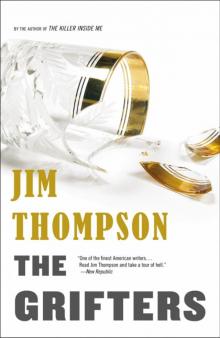 The Grifters
The Grifters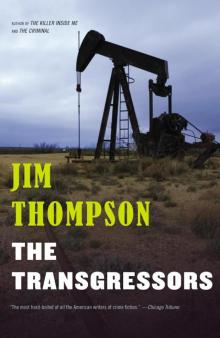 The Transgressors
The Transgressors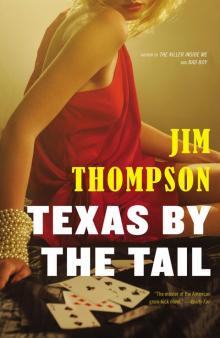 Texas by the Tail
Texas by the Tail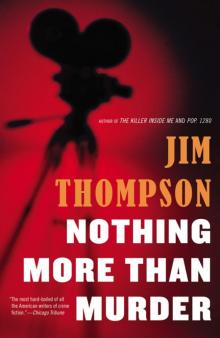 Nothing More Than Murder
Nothing More Than Murder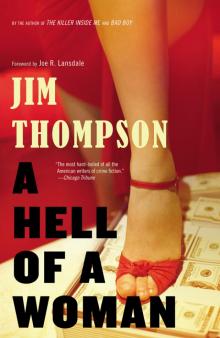 A Hell of a Woman
A Hell of a Woman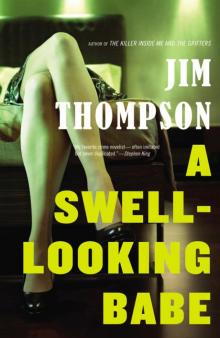 A Swell-Looking Babe
A Swell-Looking Babe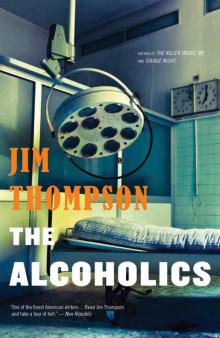 The Alcoholics
The Alcoholics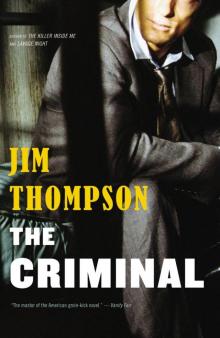 The Criminal
The Criminal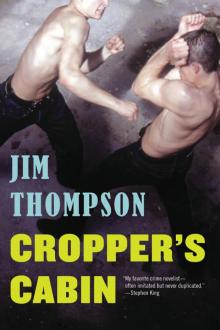 Cropper's Cabin
Cropper's Cabin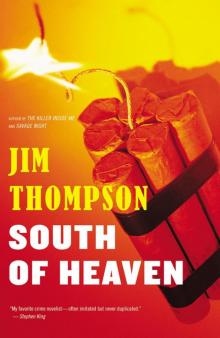 South of Heaven
South of Heaven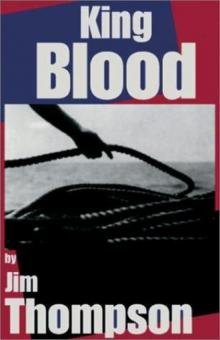 King Blood
King Blood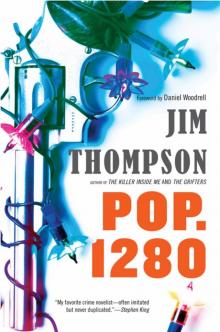 Pop. 1280
Pop. 1280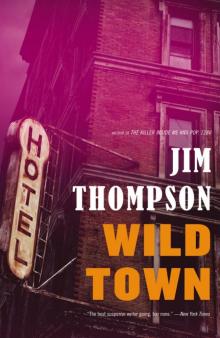 Wild Town
Wild Town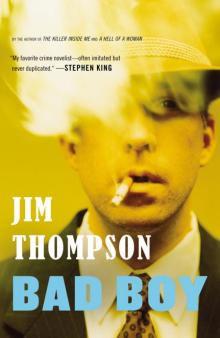 Bad Boy
Bad Boy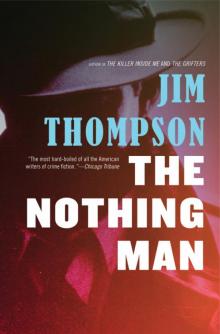 The Nothing Man
The Nothing Man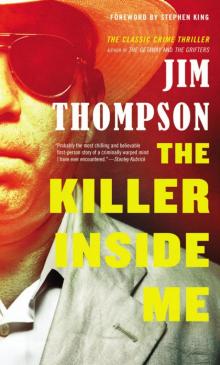 The Killer Inside Me
The Killer Inside Me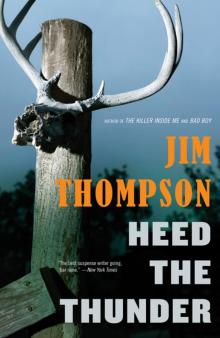 Heed the Thunder
Heed the Thunder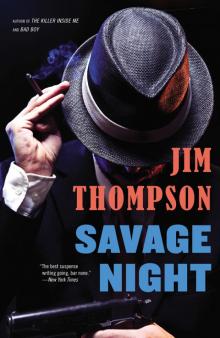 Savage Night
Savage Night Recoil
Recoil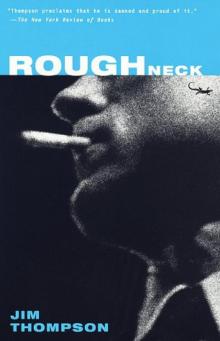 Roughneck
Roughneck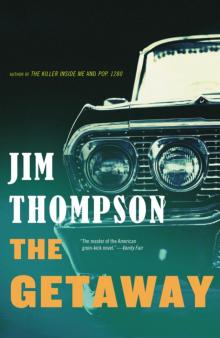 The Getaway
The Getaway